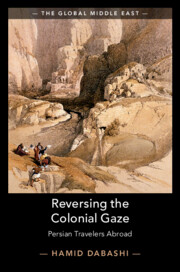Book contents
- Reversing the Colonial Gaze
- The Global Middle East
- Reversing the Colonial Gaze
- Copyright page
- Dedication
- Contents
- Figures
- Preface
- Acknowledgments
- Introduction
- 1 Mr. Shushtari Travels to India
- 2 Mirza Abu Taleb Travels from India
- 3 An Ilchi Wonders about the World
- 4 A Colonial Officer Is Turned Upside-Down
- 5 A Shirazi Shares His Travelogues
- 6 A Wandering Monarch
- 7 Hajj Sayyah Leads a Peripatetic Life
- 8 In the Company of a Refined Prince
- 9 A Wandering Mystic
- 10 In and out of a Homeland
- 11 The Fact and Fiction of a Homeland
- 12 Professor Sayyah Comes Home to Teach
- Conclusion
- Index
3 - An Ilchi Wonders about the World
Published online by Cambridge University Press: 19 December 2019
- Reversing the Colonial Gaze
- The Global Middle East
- Reversing the Colonial Gaze
- Copyright page
- Dedication
- Contents
- Figures
- Preface
- Acknowledgments
- Introduction
- 1 Mr. Shushtari Travels to India
- 2 Mirza Abu Taleb Travels from India
- 3 An Ilchi Wonders about the World
- 4 A Colonial Officer Is Turned Upside-Down
- 5 A Shirazi Shares His Travelogues
- 6 A Wandering Monarch
- 7 Hajj Sayyah Leads a Peripatetic Life
- 8 In the Company of a Refined Prince
- 9 A Wandering Mystic
- 10 In and out of a Homeland
- 11 The Fact and Fiction of a Homeland
- 12 Professor Sayyah Comes Home to Teach
- Conclusion
- Index
Summary
In Chapter 3, “An Ilchi Wonders about the World,” I focus on Abu al-Hasan Khan Ilchi’s Heyrat-Nameh/Book of Wonders (1809). Abu al-Hasan Khan Ilchi was a statesman and diplomat with many crucial missions in Russia and Europe, during one of which he lived in London for eighteen months and while there kept a detailed diary, Heyrat-Nameh, in which we read a firsthand account of the normative imagination of a high-ranking official of the Qajar period. His Heyrat-Nameh is replete with insights into the world he sees in front of him, from its highest political aspirations and social changes to varied aspects of a European culture with which he seems to be completely fascinated. As the very title of his travelogue suggests, we are in the presence of a book of marvels and wonders, of a wide-eyed observer who is lost in his uncharted admiration and yet opens up his nation to wondrous new horizons awaiting its future. What is peculiar to Abu al-Hasan Khan Ilchi’s travelogue is the fact that he was an official diplomat from the Qajar court, and in his account we encounter the initial formations of the very idea of “Iran” as a modern (colonial) nation-state. The diplomatic birth of nations as (colonial) nation-states will henceforth dialectically mark the entire course of postcolonial public spheres and their contingent subject formations. Here in Ilchi’s text we see the seeds of the dialectic in full spectrum.
Keywords
- Type
- Chapter
- Information
- Reversing the Colonial GazePersian Travelers Abroad, pp. 73 - 101Publisher: Cambridge University PressPrint publication year: 2020



